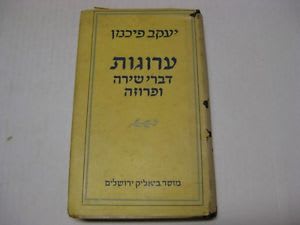Land of My Birth – Is there anybody among our readers who is not familiar with the song “Al Sefat Yam Kinneret” – On the Shores of the Kinneret? Its enchanted words were written by Yaacov Fichman, based on his great love for Eretz Yisrael and for the children of Yisrael who study Torah. The pioneering composer Chanina Kerchevsky added the finishing touch with his emotional and lyrical tune. It is no wonder that the song has become popular and has been sung in at least twenty different renditions by the most prominent singers. One thing that is less famous is the “palace” – armon – to which the poet refers in his song. Before we look into this in more detail, here is the entire song:
“On the banks of the Kinneret / There is a glorious palace / A garden is planted there / Where not a single tree moves /
Who lives there, only a boy / As a bird in the heart of the forest / He studies Torah there / From the mouth of Eliyahu the Prophet /
Not a single wave makes a sound / The voice of the flying bird / Stands by to listen / While it swallows the Torah of G-d.”
Let us return to the “palace.” The usual assumption is that this refers to a hotel that was built in 1912 to the north of the village Kinneret. The wealthy Treidel family, a mother and her three sons, who were among the first Zionist “Yekkim” to come from Germany, decided to invest their fortune and their energies in building a hotel in this arid and hot region. The village can be seen in a black and white picture from that era: a row of six tiny houses, with two public facilities at the end of the row – a school and an infirmary. The village is surrounded by a rectangular wall as a defense against unwanted guests.
But outside the wall, near the edge of the lake, there is a veritable mansion, European style – three stories high, with a tiled roof. The walls of the house are dark, since it was built from local stone, made of basalt. At the time, this “palace” could be seen from very far away, since the entire area was desolate, with no vegetation of any kind, neither trees nor bushes. Anybody visiting the area today will find it difficult to identify the site, since fresh green vegetation has been added, and at the front of the building there are palm trees rising towards the sky.
As time passed, the Treidel Hotel gained in fame, and many prominent people visited there. This included Baron Rothschild, Arthur Rupin, and the author Y. Klausner.
Tomer, a young boy, wrote an essay on family roots, quoting his grandmother Devorah, who was married to one of the three Treidel sons. Here is what he wrote:
“The Treidel House in the village of Kinneret is where my grandfather and my grandmother live, and where my father was born and raised… At first, the house was magnificent… Inside, the rooms are big and very high, there is splendid furniture, with pretty utensils that were brought from Germany. One day the poet Yaacov Fichman came. He saw the large and magnificent house which stood out in the area, and close to it he saw the Kinneret, with its quiet and peaceful water. So his imagination led him to write a legendary story about this special place, and he wrote a song called ‘A Legend’.”
The poem mentions the prophet Eliyahu. From a different Eliyahu, known as the “high priest of Hebrew songs,” Eliyahu Hakohen, I heard that this entire story about the poem “A Legend” is in itself no more than a legend. Hakohen is convinced that the poem was really written in Jerusalem, in the house of Chassia and her architect husband Eliezer Lippa Soknik (the parents of Yigal and Yossi Yadin). Chassia, who was one of the founders of the Hebrew kindergartens, asked Fichman for a legendary song for the children.
A third opinion is that the subject of the song is a 500 year old hotel named for Donna Gracia, in the heart of Teveria.
In any case, the song has long since become a legend in its own right…
Source: Dubi Zakai, “The Palace of the Kinneret,” and others. Reprinted with permission from Zomet Institute (www.zomet.org.il). Translated from the Hebrew by Moshe Goldberg. To subscribe to receive the complete version of Shabbat BeShabbato please write to dan@zomet.org.
The words of this author reflect his/her own opinions and do not necessarily represent the official position of the Orthodox Union.
